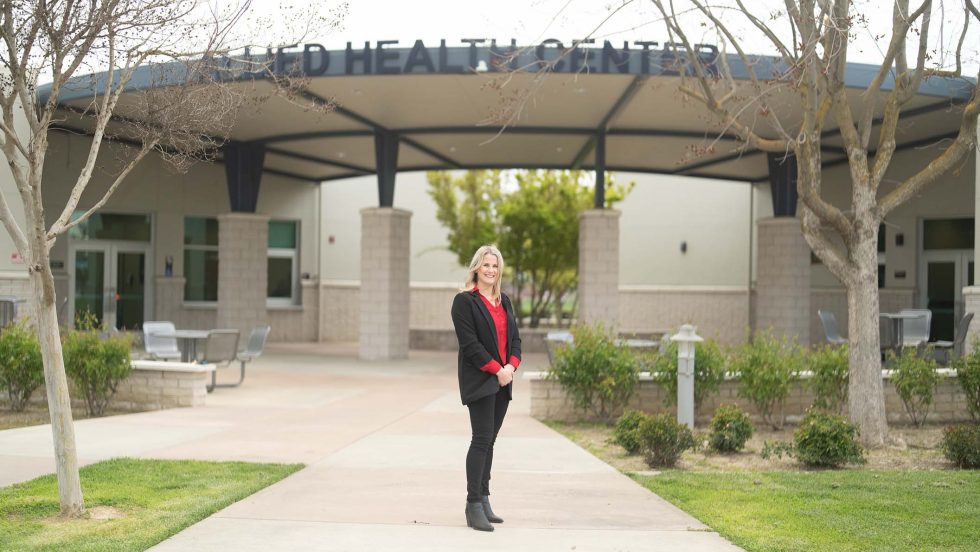The day we caught up with Lindsay Roe, assistant director of Merced College’s Registered Nursing Program, she and her colleagues were preparing for upcoming site visits by the California Board of Registered Nursing. The board in April will begin a tri-annual accreditation review and evaluate the college’s new request to expand enrollment.
“They ask for so much stuff,” Roe said. “There is so much documentation. But it’s going to be okay. We feel good about the process.”
Roe and company felt confident about meeting with the CBRN. The work represents her largest efforts to date in her new position.
Seeing into and making a new future happen is what Roe—a nursing school graduate, former clinical assistant and current theory and practical instructor at Merced College—now does since being promoted to assistant director in August of 2022.
“I was a little hesitant [to take the job],” Roe said. “I didn’t know what to expect, but it has been great. There has not been a whole lot of change to the nursing program in a long time. I feel like I am part of expanding what we do here.”
In collaboration with Director Lauren Marson, Roe ensures the faculty is adequately trained and credentialed, and that the curriculum follows CBRN guidelines. She manages grants and monitors transfer transcripts for course equivalents. To prepare for the accreditation review, she has been summarizing staff and student surveys and finding ways to implement the feedback into the program.
Roe has a vested interest in the college’s success many times over. The student graduated from the RN program at Merced College in 2007, then earned a master’s in nursing instruction from Grand Canyon University in 2017. The teacher has been a clinical assistant since 2015 and a full-time nursing professor since 2018. Now the administrator gets to help the program evolve.
Roe brings other professional training to the table. She first worked as a paramedic, training at Doctor’s Medical Center in Modesto and earning her license through Columbia College in Sonora.
“It was such an invaluable experience, but the burnout is so high for paramedics,” Roe said, describing the wear and tear on body and mind during 48-hour shifts that were common during her time. Once, when her relief didn’t show, she worked 96 hours straight.
“I would be absolutely exhausted,” she said. “Sometimes it didn’t feel safe to be working. Plus, paramedics are away from home that whole time. Nurses may work 12-hour shifts, but at the end of it, you go home. Going to nursing school was the next logical step after that.”
The Roseville and Angels Camp native put down roots at Merced College with guidance from experienced instructors. Roe said she quickly realized she’d become a successful, well-rounded RN if she heeded their advice.
For example, after being taught as a student to do the little things to make sure patients felt comfortable during their stays, Roe now catches herself telling her students the same things—pick up garbage, clear bedside tables, etc.
Her instructors—Kitty Cazares, Daniel Smith and Wanda Schindler—became Roe’s colleagues. Rochelle Grise and Gloria Provencio were also both instructors and colleagues until their recent retirements.
“I benefited from [their vast experience] at practice and in clinical settings,” she said. “So much is expected of you at clinical. I can think back to any skill I learned and remember things former instructors told me. I have never forgotten.”
Working with that kind of talent is her favorite part of being a Merced College team member.
“Everyone comes from different walks of life and backgrounds,” Roe explained. “Our faculty genuinely care about our students. It makes me proud to see everyone give their time and attention to them the way they do.”
Roe is in a leadership position at the exact time passionate, progressive leaders are needed most. The profession is in flux. Nurses in practice now must choose to withstand physical and emotional demands—as well as staffing challenges—in a post-pandemic world, or walk away.
But Roe has stayed dedicated to her craft by finding another outlet for her skills. She had been an emergency room RN for roughly three years when she started as a preceptor at Mercy Medical Center in Merced. While orienting new RNs to the ER, she found out she loved teaching, and then she excelled at it. She was eventually hired at Merced College, first as a clinical assistant and then as an instructor.
“I knew I wanted to be in the classroom and working in every aspect of training,” Roe said. “I absolutely love my job.”
We should hope other experienced nurses do the same. One reason the U.S. has faced a shortage of nurses for a couple of decades is because there haven’t been enough qualified nursing instructors to go around.
“I think initially nurses see they might take a pay cut to become instructors, and that deters them—but the [pay evens out], and it’s so rewarding,” Roe said. “Right now, with our program expansion at Merced College, we are seeing so many qualified RNs coming out of the woodwork who want to teach.”
